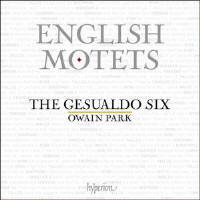Texte paru dans: / Appeared in: |
|
|
Outil de traduction ~ (Très approximatif) |
|
|
Reviewer: Jim
Svejda When Oscar A. H. Schmitz published his notorious Das Land ohne Musik in 1904, the title alone would seem to demonstrate conclusively that the man was either a fool or a complete ignoramus: Not only had Elgar produced the Enigma Variations and The Dream of Gerontius and was already thinking about his First Symphony (which two vastly more eminent Germans, Richard Strauss and Hans Richter would pronounce “the great symphony of our time”), all the Savoy Operas of Gilbert and Sullivan had been written, Purcell had made the music of the Restoration one of the glories of the 17th century, and the English vocal music of the Renaissance was clearly the equal of any being produced anywhere in the world. “The Land without Music” indeed.
This tightly-packed and shrewdly chosen anthology marks the recording debut of The Gesualdo Six—founded in 2014 by Owain Park—and what a hugely impressive debut it is. As Park explains in his eloquent and perceptive notes: “This record explores music written by some of the English Renaissance masters over a period of two hundred years, encompassing florid, medieval-sounding works by Dunstaple and Cornysh, intricately woven contrapuntal works by Tallis and Sheppard, and the beautiful simplicity of Tomkins and White.” With its impeccable blend of what are nonetheless clearly distinctive voices, The Gesualdo Six moves through this collection of often dramatically disparate works with ease, though they seem at their absolute best untangling the densest polyphonic thickets, heard to stunning effect in the Tallis anthem Suscipe quaeso Domine. Growing from two voices, the music unfolds into a rich, seven-voice texture (with Park joining in), which constantly expands and contracts according to the demands of the text. No less striking is the purity of tone and expression the singers bring to Tallis’s deceptively simple “If ye love me,” in which their rock-solid technique and unblinking concentration make this gorgeous little setting of verses from John 14 seem far easier than it actually is.
Among the works which allow the individual voices more exposure, Byrd’s buoyant, madrigal-like Vigilate contrasts brilliantly with his poignant penitential motet Miserere mei, Deus, which—in Park’s words—“dwells obsessively on the words ‘dele iniquitatem meam’ (‘do away with my wrong-doing’), an impassioned plea that eventually subsides with a delicate juxtaposition of major and minor thirds.” “Delicacy” is also the perfect description of the hypnotic Lentin Compline hymn Christe, qui lux es et dies by Robert White, who reached the height of his brief career at Westminster Abbey before dying in 1574 in his mid-30s. From the chant-like opening to the subtle harmonic shifts along the way, this is one of many works to make you wonder what White might have become had he enjoyed anything approaching a normal lifespan. Robert Parsons, who also died much too young—36 or 37, depending on the source you consult—is represented by another “what if” masterpiece, the two-and-a-half minute “Deliver me from mine enemies,” which remains a textbook example of how to make strict canons sound like the freest, most spontaneous-sounding things in the world.
While it would be possible to go on indefinitely about the album’s innumerable glories, the performance of William Byrd’s Ne irascaris, Domine—in which he draws an obvious parallel between the destruction of Jerusalem and England’s Catholic Church (to which the composer remained faithful to the end of his life)—is alone worth the price of admission, so flawlessly do The Gesualdo Six capture its mood of quiet acceptance and mournful resignation. Recorded in the acoustic of the chapel of Trinity College, Cambridge, which famously bathes everything in the warmest of golden glows, this is not only one of year’s great choral albums but is also something to put the ridiculous Herr Schmitz even more firmly in his place. | |
|
|
|
|
Cliquez l'un ou l'autre
bouton pour découvrir bien d'autres critiques de CD |
|




